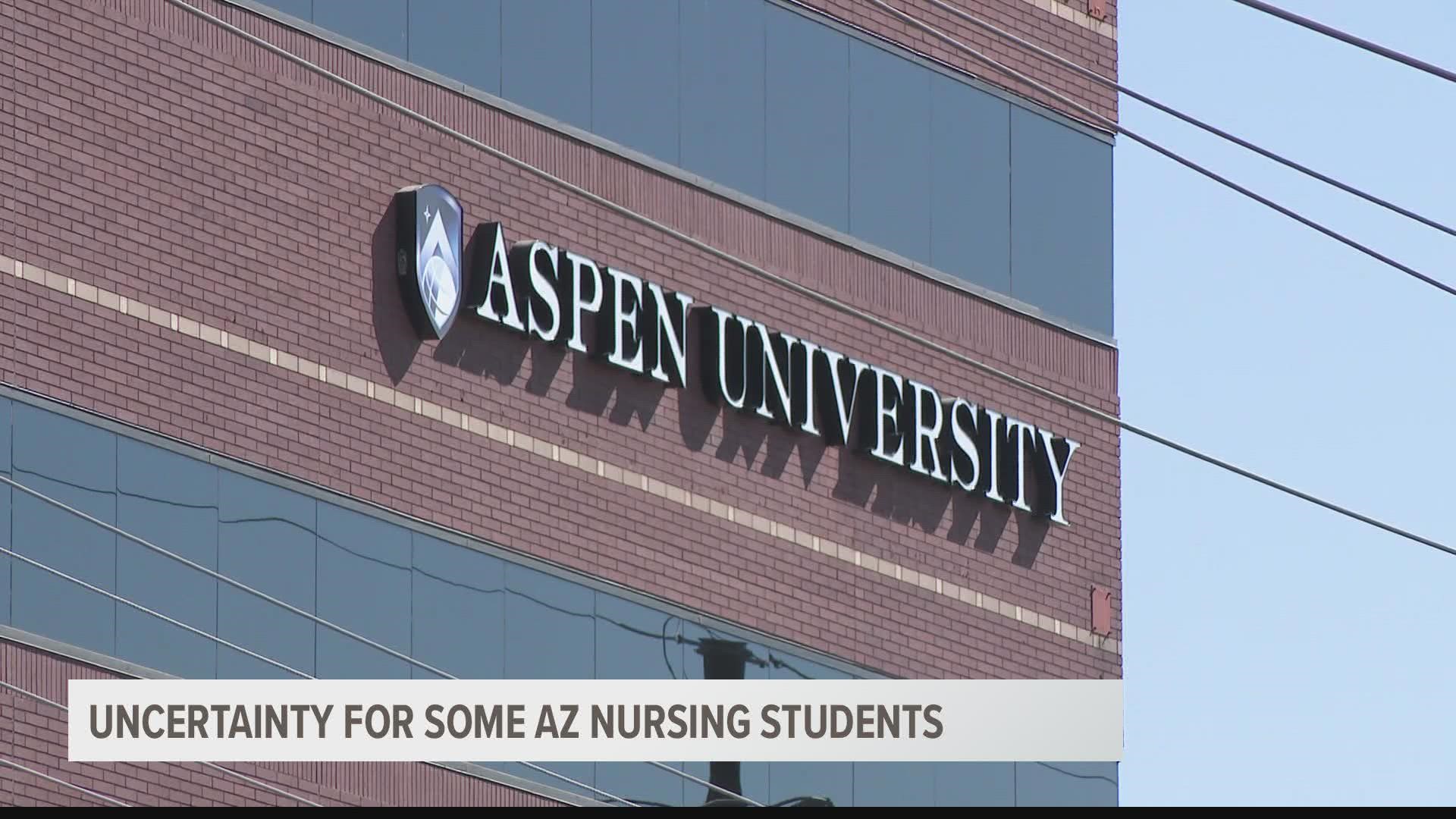PHOENIX — The uncertainty continues for hundreds of Aspen University nursing students as on Friday, the Arizona State Board of Nursing issued a Notice of Charges against the school.
This comes after the school did not sign a consent agreement offered by the board that would have required them to stop admissions for a period of time after a state investigation found the program was allegedly underperforming.
Notice of Charges
The Notice of Charges issued by the Arizona State Board of Nursing is a step forward towards possible disciplinary action for Aspen University.
The university has 30 days to respond to the charges, or can also reach a settlement during that time. If they do not respond, an administrative hearing, which is like a trial, can then be initiated.
In a statement to 12 News, the Arizona State Board of Nursing said Aspen University is not currently under any disciplinary action by the board.
The Notice of Charges was issued after Aspen University didn’t sign the consent agreement agreed upon by the board at their January meeting, where Aspen University officials were present.
During that meeting, the board discussed issues with Aspen University students not being able to pass the NCLEX exam, which is required before nursing school graduates can get their license.
Arizona law requires that nursing programs have an 80% first-time pass rate of the NCLEX.
However, the board told 12 News that Aspen University’s 2021 first-time pass rate was 58%, where 65 out of 112 students passed on their first try. Data for 2022 provided by the board showed Aspen University currently has an 85.7% first-time pass rate with 18 out of 21 students who have taken the exam so far this year passing.
Among the provisions in the consent agreement, the board would require Aspen University to suspend new admissions to the core nursing program until it reaches the 80% NCLEX pass rate and keeps it up for a year.
A consultant would also have been involved with Aspen University to address the issues.
In a statement posted on social media, Aspen University’s president said, in part, “We will not, though, sign any agreement that jeopardizes our currently enrolled student’s ability to continue to work within our academic institution to finish their degree.”
State Investigation
The Notice of Charges details findings from an investigation initiated by the State Board of Nursing after complaints were made by students and faculty at the school dating as far back as December 2020.
In the document, the state addressed the below standard NCLEX scores citing rapid growth, fewer direct care clinical learning experiences, faculty issues, and "substandard" testing practices, among other issues.
The state acknowledged that Aspen University does have a "COVID-19 panemic emergency waiver," which allows for virtual clinic experiences in lieu of hands-on learning. The board said the waiver, "still requires adequate learning experiences."
According to the state, Aspen University has been decreasing direct care clinical hours for students. In the September 2021 cohort, the state said only 270 clinical hours were recorded out of the 945 hours outlined in the student handbook.
“Since the Respondent began admitting students in July of 2018, it has never achieved the full direct care hours promised in its curriculum plan for any of its cohorts. While Respondent’s brief tenure as a program has been juxtaposed with the COVID-19 pandemic, its direct clinical hours continue to decline when other Arizona nursing programs report almost normal operations,” The Notice of Charges said.
In response, Aspen University told 12 News in a statement:
“Aspen University is committed to having a collaborative relationship with the Board of Nursing, but respectfully disputes the Board’s statement of charges, and will exercise its right to an administrative hearing. While doing so, it remains willing to enter into an appropriate consent agreement, to ensure the least amount of disruption to our students as possible.”
Students moving on
Now former Aspen University student Tonya Nelson was supposed to start her core nursing program a few days ago.
“It’s been a nightmare,” Nelson said.
However, with the state investigation and the recent developments, she wasn’t able to progress in her degree. Nelson said she had taken all of the prerequisite courses required over the past year, and had two years left to get her bachelor’s degree in nursing.
“I worked my butt off for a year only to find out I wasn't starting,” Nelson said.
Now, Nelson is getting enrolled in another college to finish up her degree and has plans to start next month if all goes as it should.
“I’m very disappointed in Aspen, I expected so much more,” Nelson said.
Further questions
The State Board of Nursing is not the only state entity questioning Aspen University.
The Arizona State Board of Private and Postsecondary Education has added the school to the agenda for their Feb. 24 meeting.
The agenda says the board will review, discuss, and could take possible action on the allegations related to the operation of Aspen University’s nursing program.
Aspen Group, the company that owns Aspen University, is already on a stipulated agreement with the State Board of Private and Postsecondary Education.
In 2019, while considering renewing the license for Aspen University, the company’s financials were called into question by the board, which expressed concern over Aspen Group’s financial losses.
As a result, the stipulated agreement now requires Aspen University posts a bond with the state in the amount of $118,677 and provides copies of educational records of students each quarter. The money is for the Board’s Student Tuition Recovery Fund, which assists students if an institution goes out of business with money they paid directly to the institution.
Up to Speed
Catch up on the latest news and stories on the 12 News YouTube channel. Subscribe today.

